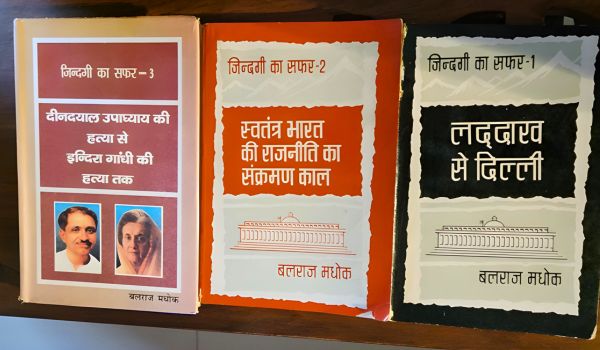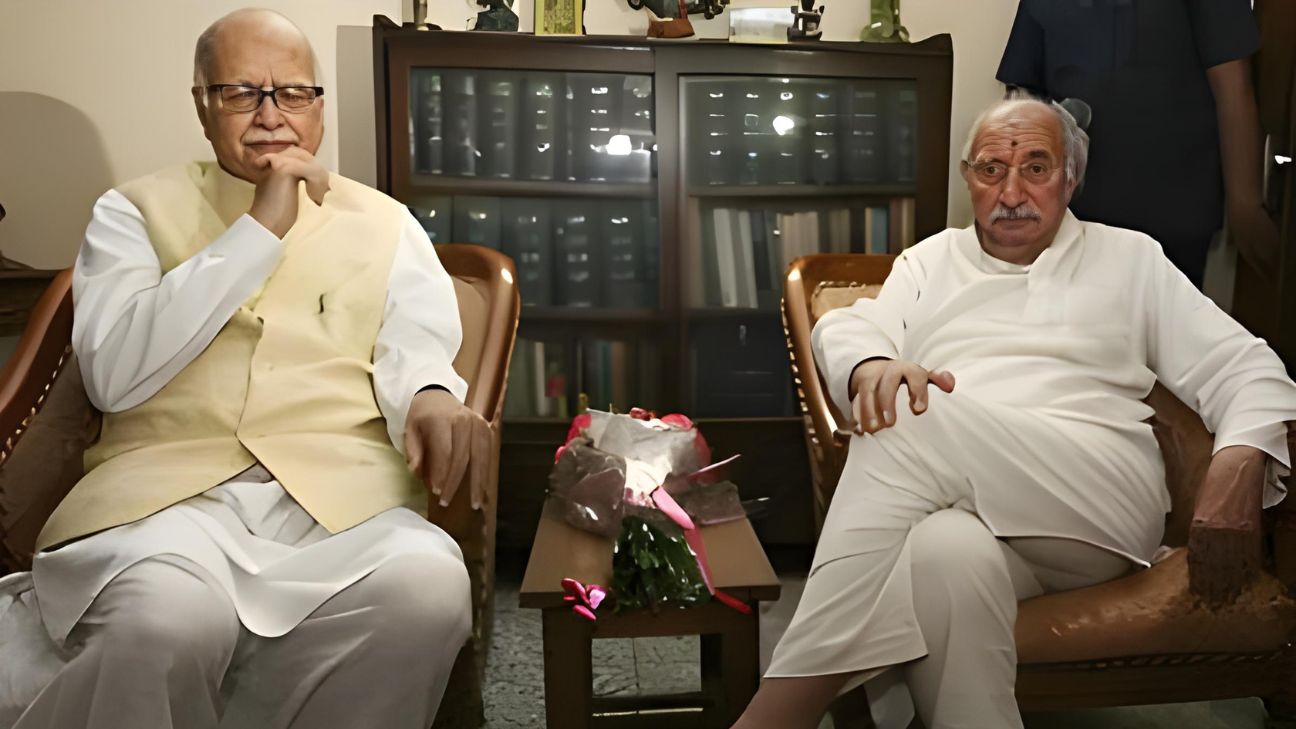Professor Balraj Madhok (25 February 1920 – 2 May 2016) was a prominent Indian nationalist thinker, educator, and politician. As a leading figure in the Rashtriya Swayamsevak Sangh (RSS) and a key founder of the Bharatiya Jana Sangh (BJS), Madhok’s influence extended across the ideological spectrum of Indian politics. His contributions to right-wing politics and his role in shaping the political landscape of post-independence India are notable.
Index of Contents
Early Life
Born on 25 February 1920 in Askardu, Jammu and Kashmir (now in Gilgit-Baltistan province of Pakistan), Balraj Madhok hailed from a Khatri family with strong ties to the Arya Samaj, a Hindu reformist movement. His father, Jagannath Madhok, was originally from Jalaun in West Punjab and worked in the Ladakh division of Jammu and Kashmir. Madhok spent his childhood in Jalaun and pursued his early education in Srinagar and Jammu.
Madhok’s higher education was completed at Dayanand Anglo-Vedic College in Lahore, where he earned a Bachelor’s degree with honors in History in 1940. During his student years, he was inspired by nationalist leaders such as Vinayak Damodar Savarkar, Bhagat Singh, and Madan Lal Dhingra, which significantly influenced his political ideologies.
At the age of 18, in 1938, Madhok joined the Rashtriya Swayamsevak Sangh (RSS), viewing it as aligned with the ideals of Arya Samaj. During the turbulent years of World War II, he rejected a military commission to serve as an RSS pracharak (campaigner).
Madhok was married to Kamla, a professor at Delhi University, and they had two daughters. His personal life was marked by his dedication to his ideological and political work, which often overshadowed his family life.
Politics Career
In 1942, he was appointed to organize RSS activities in Jammu. His early efforts included establishing RSS branches and gathering intelligence about Pakistan’s intentions during the partition period. Madhok played a crucial role in defending Kashmir during the early days of the conflict post-partition, mobilizing volunteers to safeguard key areas such as the Srinagar airport.
His role during the partition of India was crucial; he gathered intelligence on Pakistan’s plans to invade Kashmir and mobilized volunteers to defend the region. In 1951, Madhok, along with Dr. Shyama Prasad Mukherjee, co-founded the Bharatiya Jana Sangh (BJS), which aimed to promote a nationalist and conservative agenda.
Madhok was instrumental in preparing the party’s manifesto and establishing its organizational structure. His leadership was critical in expanding the party’s influence, particularly in Delhi and Punjab. He also founded the Akhil Bharatiya Vidyarthi Parishad (ABVP) in 1951 as a student wing of the RSS.
Madhok’s role in the BJS was pivotal; he was elected as the party’s president in 1966, succeeding Mukherjee. Under his presidency, the BJS experienced significant electoral success, securing 35 seats in the 1967 elections and establishing itself as a major opposition force. Madhok’s leadership helped the party gain prominence and expand its presence across several states. He was also elected to the Lok Sabha in 1961.
Challenges
Madhok’s tenure as BJS president was marked by internal conflicts, especially after the assassination of Deendayal Upadhyaya in 1968. Madhok’s conservative and outspoken views often clashed with more moderate party members, including Lal Krishna Advani. This discord eventually led to Madhok’s marginalization within the party.
In February 1973, Madhok presented a note to the National Executive of Jana Sangh in Kanpur. On that note, Madhok expressed views contrary to the party’s ideology on economic policy and the nationalization of banks.
He also criticized the increasing influence of RSS on Jana Sangh and advocated for a more democratic functioning of the party by removing organizational ministers. Lal Krishna Advani, then National President of Jana Sangh, expelled Madhok from the party for three years for allegedly breaking party discipline and engaging in anti-party activities. Madhok was deeply hurt by this incident and never returned to the party.
Following his expulsion, Madhok attempted to revive the BJS under the name ‘Akhil Bharatiya Jansangh’. Despite his efforts, these attempts did not achieve significant success. He also associated with the Bharatiya Lok Dal led by Chaudhary Charan Singh. During the Emergency imposed by Indira Gandhi, Madhok was arrested and spent 18 months in prison.
After the Emergency, Madhok joined the Janata Party but faced continued marginalization. His opposition to the merger of BJS with the Janata Party further isolated him from mainstream politics. In 1979, he left the Janata Party and continued his efforts to revive the BJS, but these efforts proved largely ineffective.
Books and Publication
Madhok was a prolific writer and his autobiographical work, Zindagi Ka Safar, is a critical and controversial account of his political career. The three-part autobiography is described as a political thriller and reveals various suppressed aspects of Indian politics. The book is known for its critical examination of Jawaharlal Nehru and the Congress party, as well as its exposure to internal conflicts within the RSS and BJS.
The book also names individuals allegedly involved in the murder of Deendayal Upadhyaya and provides insight into the formation of the Minority Commission during Morarji Desai’s government. It reveals that the Minority Commission was formed for the first time in Morarji Desai’s government and sheds light on Madhok’s discontent with both political and ideological adversaries.
Madhok had written his biography in three parts – ‘Zindagi Ka Safar’! This biography is a political thriller, especially about the history of Jansangh which is still suppressed. It also reveals the real face of Jawaharlal Nehru and Congress, as well as the internal conflicts within the Sangh and the Jana Sangh.
Balraj Madhok was a prolific writer and editor, contributing significantly to Indian political literature and thought. His extensive body of work includes over 30 books, reflecting his deep engagement with Indian politics, history, and ideology. Below is a comprehensive list of his notable books and publications:
Editing and Writings
- Organiser (1947-48): Madhok served as the editor of this influential journal, which played a crucial role in shaping the discourse of the Rashtriya Swayamsevak Sangh (RSS) during a pivotal period in Indian history.
- Veer Arjun (1948): He also edited this publication, which contributed to the nationalist narrative of post-independence India.
Books

- Resurgence of Muslim Problem in Divided India: An analysis of the Muslim issue in the context of a divided India.
- Kashmir: Defeat in Victory: A critical examination of Kashmir’s political and military challenges.
- Partitioned Kashmir: A detailed account of Kashmir’s division and its implications.
- Victory or Defeat: A reflection on political outcomes and their significance.
- Dr. Shyama Prasad Mukherjee – A Biography: A biography of one of the key figures in Indian politics and co-founder of the Bharatiya Jana Sangh.
- Kashmir: Centre of New Alignments: Discusses the strategic importance of Kashmir in geopolitical alignments.
- Pakistan: Beginning and End: An exploration of the origins and trajectory of Pakistan.
- Zindagi Ka Safar (Parts 1, 2, 3): Madhok’s autobiographical work offers a detailed and controversial account of his life and political career. It includes critical insights into Indian politics and the internal dynamics of the RSS and BJS.
- Hindustan on the Cross Roads (Mehta Brothers, Lahore, 1946): A pre-independence work addressing the crossroads of Indian politics.
- Portrait of a Martyr: Biography of Shyama Prasad Mukherjee: A detailed biography of Mukherjee, highlighting his contributions and martyrdom.
- Kashmir: The Storm Centre of The World (A. Ghosh, Texas, 1992): A discussion on Kashmir’s significance in global politics.
- A Story of Bungling in Kashmir (Young Asia Publications, 1972): An analysis of the mishandling of the Kashmir issue.
- Kargil and Indo-Pak Relations: Examines the Kargil conflict and its impact on Indo-Pak relations.
- Rationale of Hindu State: Explores the philosophical and practical underpinnings of the concept of a Hindu state.
Additional Publications
- Kashmir Problem: A Story of Bungling (Bharti Sahitya Sadan, 1952): An early work critiquing the management of the Kashmir issue.
- Kashmir: Center of New Alignments (Deepak Prakashan, 1963): Further analysis of Kashmir’s geopolitical position.
- Jammu, Kashmir, and Ladakh: Problem & Solution (Reliance Publishing House, 1987): Discusses solutions to the issues faced by Jammu, Kashmir, and Ladakh.
- Kargil and Indo-Pak Relations: Addresses the Kargil conflict and its implications for Indo-Pakistani relations.
- Indian Nationalism (Bharti Sahitya Sadan, 1969): A work on the concept of Indian nationalism.
- Indianisation? What, Why, and How (S. Chand, 1970): Examines the concept of Indianization and its implications.
- Political Trends in India (S. Chand, 1959): Analyzes the political trends shaping India.
- India’s Foreign Policy & National Affairs (Bharatiya Sahitya Sadan, 1969): Provides insights into India’s foreign policy and national affairs.
- Murder of Democracy (S. Chand, 1973): A critique of democratic practices and institutions.
- Reflections of a Detenu (Newman Group, 1978): Madhok’s reflections during his period of detention.
- Stormy Decade: Indian Politics, 1970–1980 (Indian Book Gallery, 1980): A critical analysis of the political developments in India during the 1970s.
- Connection (Hindu World Publications, 1985): Explores connections within Indian political and ideological contexts.
Balraj Madhok’s written works reflect his deep engagement with Indian politics, history, and ideology. His extensive publications, ranging from autobiographical accounts to critical analyses of political issues, have contributed significantly to the discourse on Indian nationalism, Hindu statehood, and regional conflicts. His writings continue to offer valuable insights into the complexities of Indian politics and the challenges faced by the country during his time.
Legacy
In his later years, Balraj Madhok withdrew from active politics and lived with his daughters in New Rajendra Nagar, central Delhi. He passed away on 2 May 2016 at the age of 96. His final days were marked by illness, and he died at his residence.
His passing went largely unnoticed by many in the political sphere, with only his daughter by his side. Despite his significant contributions, he died with minimal support from his former political allies. Madhok’s legacy is complex.
He was a staunch advocate of Hindutva and Indianization, with strong views on integrating minorities into the national mainstream while preserving their cultural identities. His efforts to promote a ban on cow slaughter and address the Babri Masjid issue remain notable aspects of his political ideology.
In conclusion, Balraj Madhok’s life and career reflect the turbulent and transformative nature of Indian politics in the mid-20th century. His role in shaping the right-wing ideological framework and his contributions to the Bharatiya Jana Sangh and RSS have impacted Indian political discourse. Despite the controversies and challenges he faced, Madhok’s influence on Indian politics and his candid writings continue to be significant.
